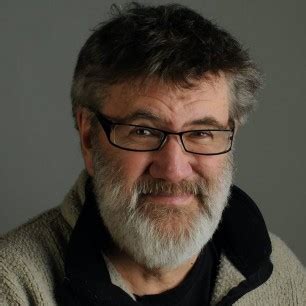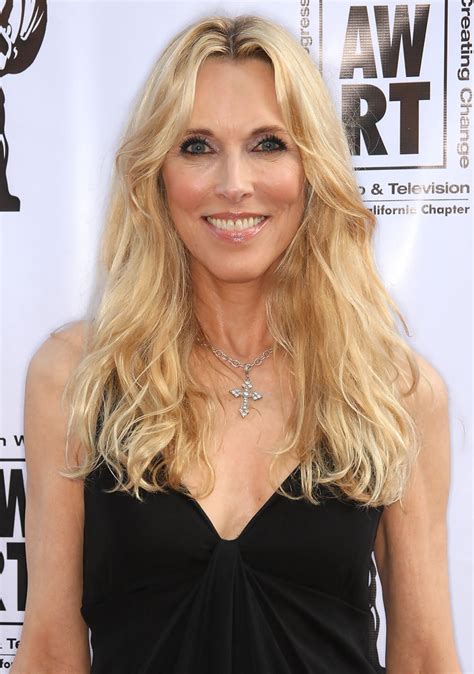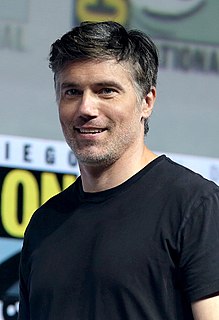A Quote by Tim Wynne-Jones
The deep-read is when you get gut-hooked and dragged overboard down and down through the maze of print and find, to your amazement, you can breathe down there after all and there’s a whole other world. I’m talking about the kind of reading when you realize that books are indeed interactive. . . . I’m talking about the kind of deep-read where it isn’t just the plot or the characters that matter, but the words and the way they fit together and the meandering evanescent thoughts you think between the lines: the kind of reading where you are fleetingly aware of your own mind at work.
Quote Topics
About
After
Amazement
Aware
Between
Between The Lines
Books
Breathe
Characters
Deep
Down
Down And
Dragged
Evanescent
Find
Fit
Get
Gut
Hooked
Indeed
Interactive
Just
Kind
Lines
Matter
Maze
Mind
Other
Overboard
Own
Plot
Print
Read
Reading
Realize
Talking
Think
Thoughts
Through
Together
Way
Whole
Words
Work
World
Your
Related Quotes
Attention spans are changing. It's very noticeable. I am very aware that the kind of books I read in my childhood kids now won't be able to read. I was reading Kipling and PG Wodehouse and Shakespeare at the age of 11. The kind of description and detail I read I would not put in my books. I don't know how much you can fight that because you want children to read. So I pack in excitement and plot and illustrations and have a cliffhanger every chapter. Charles Dickens was doing cliffhangers way back when. But even with all the excitement you have to make children care about the characters.
That's what I love about writing. Once you get the words down on paper, in print, they start to make sense. It's like you don't know what you think until it dribbles from your brain down your arm and into your hand and out through your fingers and shows up on the computer screen, and you read it and realize: That's really true; I believe that.
I can always be reminded how small I am when I try to surf a wave that's a little bit out of my league, and I just get pummeled. And, when your life flashes before your eyes kind of stuff, deep down under the water where you don't know what's up or down, and that kind of thing, or just Mother Nature reminding you how small you are compared to it. That's kind of the main thing for me.
Despite wanting to work in publishing, I was a publisher's worst nightmare: I rarely bought new books. So my goal was to publish the kind of books I would buy, and read. My reading habits have changed since starting the press. The only other "goal", per say, is to continue to experiment. I don't want the press to ever fall into a formula, or to be pigeonholed - "They do great reissues of modernist poets!" - I want to keep pushing, exploring the kind of title we can get away with. And working with authors who challenge the way I think about writing, editing and reading.
We like books that have a lot of dreck in them, matter which presents itself as not wholly relevant (or indeed, at all relevant) but which, carefully attended to, can supply a kind of "sense" of what is going on. This "sense" is not to be obtained by reading between the lines (for there is nothing there, in those white spaces) but by reading the lines themselves looking at them and so arriving at a feeling not of satisfaction exactly, that is too much to expect, but of having read them, of having "completed" them.
The kind of hope I'm talking about is the belief that something good will come. That everything you're going through and everything you've gone through will be worth the struggles and frustrations. The kind of hope I'm talking about is a deep belief that the world can be changed, that the impossible is possible.
The spark for 'In Praise of Slowness' came when I began reading to my children. Every parent knows that kids like their bedtime stories read at a gentle, meandering pace. But I used to be too fast to slow down with the Brothers Grimm. I would zoom through the classic fairy tales, skipping lines, paragraphs, whole pages.
Reading, because we control it, is adaptable to our needs and rhythms. We are free to indulge our subjective associative impulse; the term I coin for this is deep reading: the slow and meditative possession of a book. We don't just read the words, we dream our lives in their vicinity. The printed page becomes a kind of wrought-iron fence we crawl through, returning, once we have wandered, to the very place we started.
You learn so much with each book, but it's what you teach yourself by writing your own books and by reading good books written by other people - that's the key. You don't want to worry too much about other people's responses to your work, not during the writing and not after. You just need to read and write, and keep going.
He that is to govern a whole Nation , must read in himself, not this, or that particular man; but Mankind; which though it be hard to do, harder than to learn any Language, or Science; yet, when I shall have set down my own reading orderly, and perspicuously, the pains left another, will be only to consider, if he also find not the same in himself. For this kind of Doctrine, admitteth no other Demonstration.



































